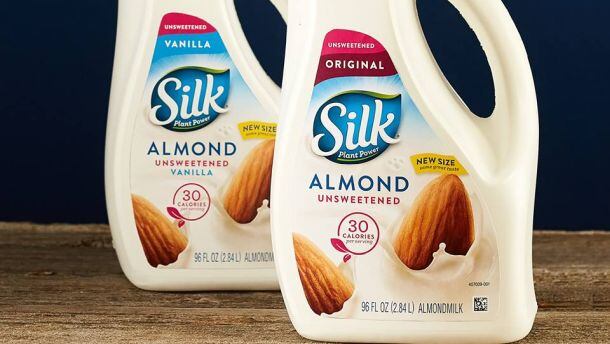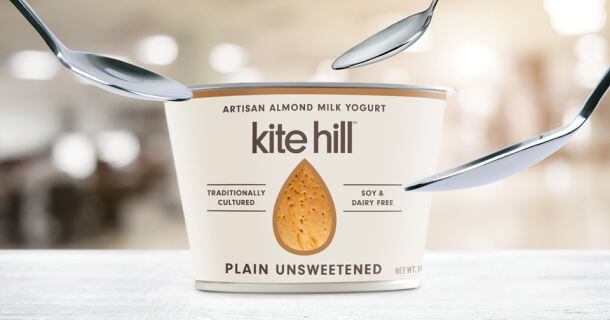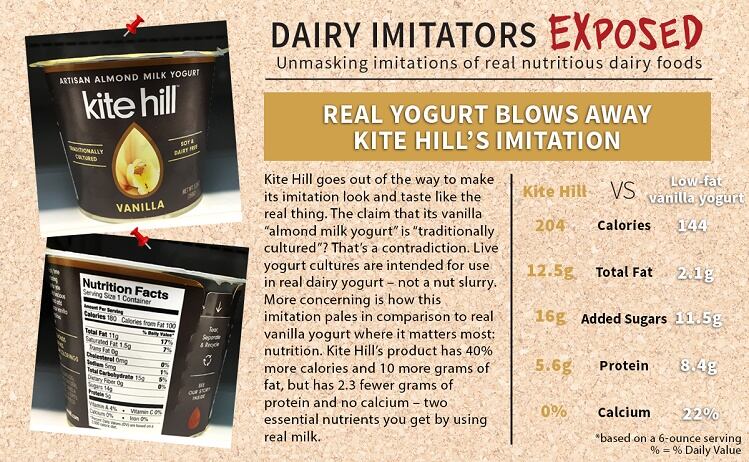Jenny Berrien, VP of marketing for Kite Hill – which makes almondmilk-based ‘cheeses,’ ‘yogurts’ and other products – was speaking to FoodNavigator-USA after the NMPF wrote to the FDA and the California Dept of Agriculture to accuse the brand of violating federal standards of identity by using the term ‘yogurt’ on a non-dairy product.
The letters also accuse Kite Hill of misleading shoppers by “falsely implying they [its almondmilk yogurts] are a suitable substitute for real dairy yogurt” and claim Kite Hill products are nutritionally inferior to their dairy-based counterparts.
Given that Kite Hill states that the products at issue are ‘dairy free’ on the front of the pack, and that the word ‘yogurt’ is preceded by the words ‘almond milk’ on the labels, it was hard to see grounds for consumer confusion, however, said Berrien.
"We looked at a lot of terms in the market but decided that 'artisan almond milk yogurt' was the most understandable to consumers. We work with outside regulatory counsel on our labeling decisions to make sure we're in compliance with labeling laws."
As for nutrition, Kite Hill does not market its yogurts as nutritionally equivalent to dairy, she added, noting that consumers pick plant-based products for many reasons, from taste, to allergies and intolerances, sustainability, and animal welfare.
"Some of our consumers are looking to reduce dairy, and some are interested in the benefits of nuts, but we also know that a lot of our consumers have dairy and almond products in their fridges."
Attorney: Letter unlikely to spur FDA into action
So will this prompt action from the FDA (which has not responded to requests for comment)?
It’s possible, but not likely, given the NMPF is not saying anything it hasn’t said before, and civil litigation challenging terms such as almondmilk and soymilk has failed to make much progress through the courts, observed Amin Talati Upadhye attorney Ryan Kaiser,
“It’s just more of the same… I don’t expect the FDA to take action based on this letter…especially given its yawn of a response [to a Good Food Institute petition calling for clarity on this issue] back in August.”
Asked about nutritional equivalency, he suggested that consumers buy dairy alternatives for many reasons, adding: “I recall a time when my wife was cutting dairy from her diet and we searched for dairy-free cheese products. It wasn’t because she was looking for calcium…she just wanted to make a grilled cheese sandwich.”

The FDA, say critics, has fluctuated unhelpfully on the issue of whether terms such as 'almondmilk' or 'vegan cheese' violate federal standards of identity or mislead shoppers.
For example, it queried the term ‘soy milk’ in warning letters to manufacturers Lifesoy in 2008 and Fong Kee Tofu in 2012, but thereafter maintained radio silence on the topic, which plant-based brands say leaves them vulnerable to lawsuits, and dairy milk producers (who believe plant ‘milk’ brands are openly flouting the law), find infuriating.
The agency also raised eyebrows in 2016 by telling Hampton Creek it could keep its ‘Just Mayo’ brand name for its egg-free spread (which does not comply with the standard of identity for mayonnaise), albeit with minor tweaks to the label, just weeks after accusing it of violating said standard.
Read more about the debate HERE.
GFI: The markets are working...
Good Food Institute senior policy specialist Joanna Grossman, PhD, added: “Once again, NMPF is looking for a way to rile people up and garner attention so the issue doesn’t die down completely. Not surprisingly, this type of complaint hasn’t gotten much traction at the federal level or with consumers, because no one really believes anyone is being confused by plant-based products. Markets are working and people are buying the quality products they prefer."
PBFA aims to release guidelines in March: 'The real goal is to create a consistent nomenclature approach'
Michele Simon, executive director of the Plant Based Foods Association (PBFA), meanwhile, said the PBFA was talking to the FDA about labeling conventions for plant-based foods and beverages, and had created a formal standards committee to address them.
Members want “to ensure a fair and competitive marketplace,” added Simon, who said the PBFA is focusing initially on how firms might address inconsistencies between the way plant-based milks are currently labeled (for example some say ‘plant-based beverage,’ some have a gap between almond and milk, some have disclaimers such as ‘dairy-free’ or ‘non-dairy’ next to the description and so on.)

“It’s not about a lack of compliance or a legal issue [the PBFA maintains that terms such as almondmilk are both lawful and pragmatic] but one of consistency. The real goal is to create a consistent nomenclature approach. But no one is trying to fool consumers. It’s exactly the opposite.
“I think because they [the NMPF] haven’t gotten anywhere with the consumer confusion angle, they are trying a different approach with the nutritional equivalency angle. But I don’t agree that dairy is the gold standard for nutrition.”
From a legal perspective, meanwhile, there is no reason why plant based milks should be nutritionally equivalent to dairy milk, she said. In fact, this may not necessarily be desirable, she added, as most Americans aren’t short of protein, which is typically higher in dairy milks than plant-based ones, while some consumers might choose to avoid dairy owing to its saturated fat content, for example.
She added: “We’ve completed a consumer survey and we’re in the process of drawing up the first set of guidelines for industry for the plant-based milk category, and we’re hoping to release that in early March in time for the Expo West show. After that we’ll look at cheese.”

"Kite Hill’s imitation 'yogurt' product does not comply with the federal standard of identity for yogurt (21 CFR 131.200). The standard defines yogurt as produced by culturing cream, milk, partially skimmed milk, or skim milk, alone or in combination, with specific lactic acid bacteria...
"Kite Hill’s ploy to market its product using dairy food terminology can lead consumers to think its imitation yogurt is a nutritionally viable substitute for cow’s milk yogurt. However, without real milk’s many nutrients as a base, this fake yogurt product fails to deliver the same nutrition as the real thing."
NMPF: We are keeping the pressure on the FDA
Asked why the NMPF had targeted Kite Hill given that other brands also use the term ‘almondmilk yogurt,’ NMPF SVP communications Chris Galen said Kite Hill was the first brand to be singled out in 2018, but would not be the last.
He added: “We plan in 2018 to be more vocal about specific brands of plant-based foods, whether they are milk, yogurt, cheese, or other imitators. So those other products may also draw our attention going forward.”
Asked whether other terms such as ‘yogurt alternative’ deployed by brands such as Silk and So Delicious were more acceptable to the NMPF, he added: “US regulations allow for this product to call itself ‘imitation yogurt’ but not ‘yogurt alternative.’”
But what if – as many stakeholders are predicting – the letters do not spur the FDA into action on this issue? Will the Dairy Pride Act (a dairy-industry-backed bill proposing a crackdown on ‘misbranded milk alternatives’) make any progress through Congress instead?
Said Galen: “Given that Capitol Hill rarely passes individual pieces of legislation, we’re looking for opportunities to move the bill as a part of some larger legislative package… Keep in mind that the goal of the legislation is to force FDA to enforce its existing standards of identity, so we are also keeping the pressure on FDA to take action.”

